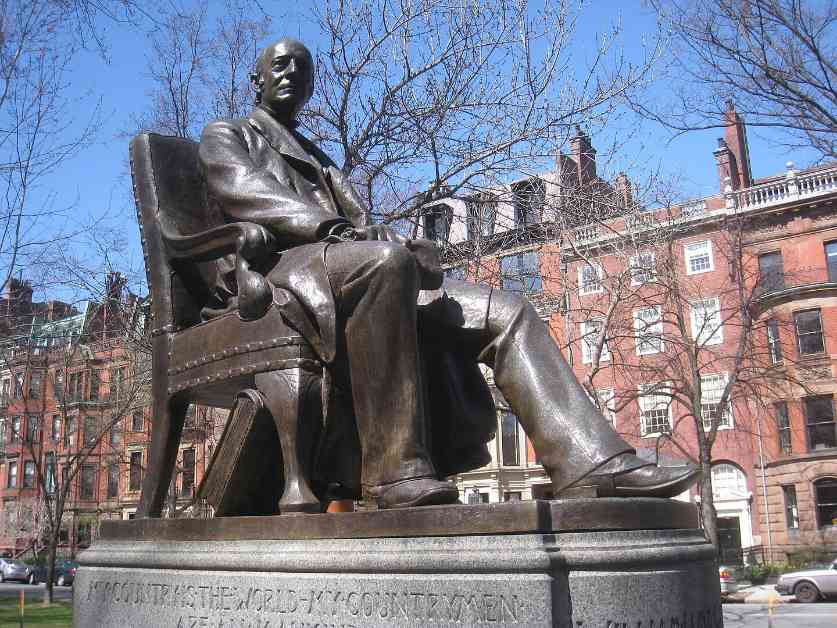William Lloyd Garrison: The Journey from Vermont Journalist to Abolitionist Icon
At the corner of Commonwealth Avenue in Boston, a statue of William Lloyd Garrison stands tall, a symbol of a man who transitioned from an aspiring journalist in Vermont to a prominent abolitionist leader who left an indelible mark on American history. Garrison’s legacy is rooted in his fierce opposition to slavery, a cause that consumed his life and reshaped the national conversation on human rights.
Born into a family marred by his father’s struggles with alcoholism, Garrison’s early exposure to social injustices fueled his passion for reform. While his initial advocacy leaned towards gradual emancipation, his convictions evolved over time, leading him to champion immediate and complete liberation for enslaved individuals. In his mid-20s, Garrison founded the New England Anti-Slavery Society and the American Anti-Slavery Society, wielding the power of his widely circulated newspaper, The Liberator, to ignite change and pave the way for President Lincoln’s Emancipation Proclamation.
Back in 1828, a pivotal moment in Garrison’s journey unfolded when a group of influential men from Bennington, Vermont, recognized his potential and offered him the editorship of the Journal of the Times. This opportunity not only provided Garrison with a platform to advocate for his social causes but also marked the beginning of his foray into the political landscape of the time. The newspaper’s mission, rooted in supporting President John Quincy Adams’ re-election, reflected the era’s “party press” dynamics, where media outlets aligned with political factions to influence public opinion.
As Vermonters rallied behind Adams and his National Republican party, Garrison found himself thrust into a polarized political climate dominated by contrasting visions of governance. Adams’ advocacy for a robust federal government to drive economic growth clashed with Jackson’s emphasis on decentralized power and skepticism towards centralized authority. The political rivalry between the two candidates mirrored a deeper ideological divide in American society, with Garrison’s editorial prowess shaping the narrative in Bennington County.
In the lead-up to the elections in November 1828, Garrison’s penmanship illuminated the stakes of the looming political showdown, portraying Jackson as a figure tainted by violence and tyranny. His fervent defense of Adams, motivated more by opposition to Jackson than genuine support for the incumbent, underscored the intensity of the electoral battle unfolding in Vermont. Despite Garrison’s efforts, Adams faced defeat at the hands of Jackson, signaling a seismic shift in the political landscape that reverberated far beyond the borders of the Green Mountain State.
Following the election’s outcome, Garrison’s focus shifted towards broader social reform initiatives, with his editorial platform evolving to encompass a range of pressing issues, including slavery eradication and educational reform. The convergence of Garrison’s journalistic acumen and social conscience laid the groundwork for his transformation into a staunch abolitionist, a trajectory that culminated in a fateful encounter with Quaker activist Benjamin Lundy.
Lundy’s unwavering commitment to the abolitionist cause resonated deeply with Garrison, spurring him to embrace the call for immediate emancipation and challenge the prevailing narratives of colonization. Their collaboration marked a turning point in Garrison’s trajectory, propelling him towards a lifelong commitment to dismantling the institution of slavery and advocating for the rights of all individuals.
As Garrison’s journey unfolded, his path intersected with pivotal moments in American history, culminating in a momentous speech on the Fourth of July in 1829 that laid bare the contradictions of slavery in a nation founded on principles of freedom. Garrison’s impassioned plea for justice echoed through the halls of Boston’s Park Street Church, heralding a new chapter in his crusade against the evils of slavery.
With Frederick Douglass delivering a poignant eulogy at Garrison’s passing in 1879, the torch of abolitionism was passed to future generations, a testament to Garrison’s enduring legacy as a champion of human rights and a beacon of hope in the fight for freedom. As Douglass aptly remarked, Garrison’s memory remains a precious inheritance, a reminder of the transformative power of one individual’s unwavering commitment to justice and equality.
In the annals of American history, William Lloyd Garrison’s journey from Vermont journalist to abolitionist leader stands as a testament to the enduring power of activism and the indomitable spirit of those who dare to challenge the status quo. His legacy serves as a beacon of hope and inspiration for all who strive to leave the world freer, nobler, and better than they found it.









